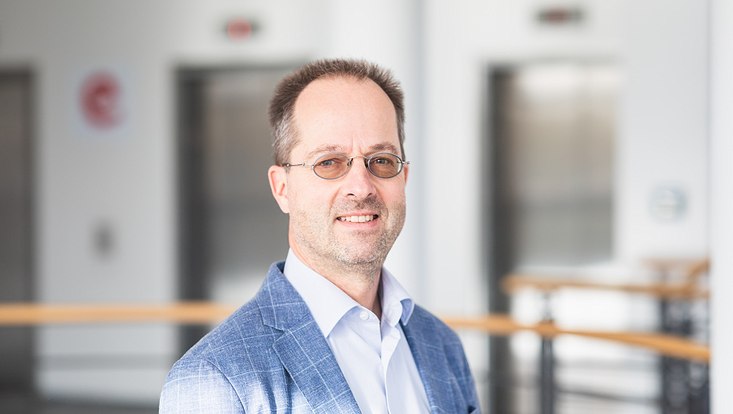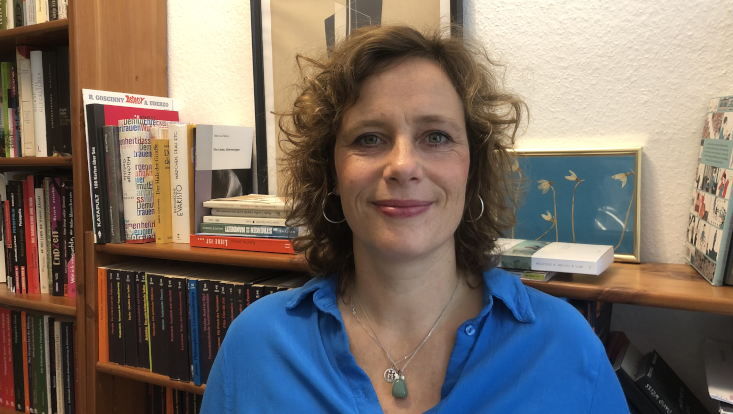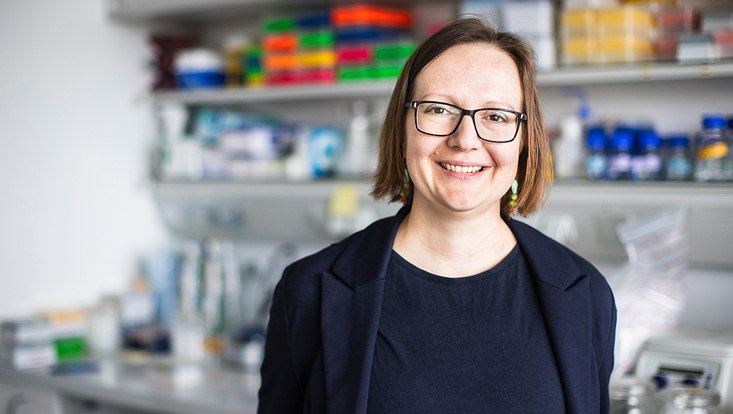Welcome aboard!“I would be happy if discussions about the New Testament would continue at home or cafés.”Prof. Dr. Eckart David Schmidt strengthens the humanities.
7 November 2023, by Schmidt/Red.

Photo: UHH/Röttger
Every year, Universität Hamburg welcomes numerous new researchers. This series introduces them and their areas of research. This time: theology scholar Prof. Dr. Eckart David Schmidt.
Prof. Dr. Eckart David Schmidt joined the Faculty of Humanities in winter semester as a professor of Protestant theology with a focus on the New Testament. Prior to that, he worked at the University of Heidelberg.
My research area in 3 sentences:
One my major areas in the last few years was the historical research on the New Testament, especially from the late eighteenth century. In my view, historical research of this old text makes it easier to place and understand your own approach. This greatly expands your perspective!
Furthermore, my current areas of work and in the coming years include the different ways of treating the figure of Jesus of Nazareth—historically but also artistically, with distortions or provokingly—and the approach to and interpretation of guilt and forgiveness as well as Peter’s First Epistle.
This is how I explain my research to my family:
At any rate, not all at once! :-D But in all seriousness: such “explanations” naturally depend on who I believe my conversation partner is. Sometimes I have to explain very generally why there is even such a thing as theological research and what interpreting theologically means. What notions of the human form the basis for or are activated in debates on abortion, euthanasia, gender, in political decisions, but also in Hollywood movies or things like that? What wishes or ideals form the basis of these notions? It’s just a short jump to the theological interpretation of one’s own existence. However, I don’t necessarily get to my own concrete research in these kinds of conversations.
In other conversations, however, I can more quickly explain, for example, that I continue to be fascinated by the peculiar treatment of this little craftsman from the backwoods of the Roman Empire and to whom virtually boundless attributes were assigned with astounding momentum, and in the most improbable of circumstances. I then make that concrete, for example, using examples from the historical research or even current magazines or other analog sources; the same is true, for example, when treating freedom and humility in Peter’s First Epistle.
In Hamburg, the city and the University, I am looking forward to:
What a question! Hamburg, of course, is unarguably one of Germany’s most beautiful and multifarious cities! The wind, the Elbe, the proximity to the ocean ... .The cultural scene has especially inspired me—as a trained musician. How could you not look forward to Hamburg? Above and beyond that, I have so far found our department and the people there exceptionally friendly, helpful, and welcoming.
These are my plans at Universität Hamburg:
First, I naturally have to really get to know Universität Hamburg and the department. “We’ll cross that bridge when we get to it,” they say in England. After stepping in for others at several universities throughout Germany in the last few semesters, I know that the theological faculties and institutes can be very different and have very different profiles. At the moment, at any rate, there are already 3 book projects ahead, with very different kinds of publishers and for different target groups (but I don’t want to create false expectations here). I would like to use courses and conferences to prepare or flank these projects.
This is why students should come to my lectures:
First, I do not think that students should attend my courses instead of my colleagues’ courses. I am always delighted to have above all students of theology whose favorite subjects are different than my own. I would also be happy, however, to awaken a certain interest in the New Testament and to inspire further discussions about it at the café or at student apartments.
Reaching out to the world: I work with the following international and federal institutions and universities:
I regularly attend relevant international exegetical and, time permitting, theological conferences and I spent 7 years abroad, in Great Britain and Croatia. I still have good contacts to the Protestant-theological department in Zagreb and I would like to intensify these. Perhaps the new Hamburg Department of Religions will be a good starting point for that and that could be exciting because theological training and study in the Balkans has very different concerns and conditions than here in Germany.
My research is important for society because:
I think theological competencies with regard to existential topics and concerns in our era of global commercialization and crises are especially important as our general social awareness in work, education, and family life, etc. decreases. Who are we as people? What distinguishes us from computer and AI? What are our options for making decisions, or setting boundaries and goals? What are the economics of our concerns with regard to their existential dimensions? What is the meaning or purpose of “God” in our post-enlightenment age? I hope that the New Testament can be a point of reference and guide for these questions.


